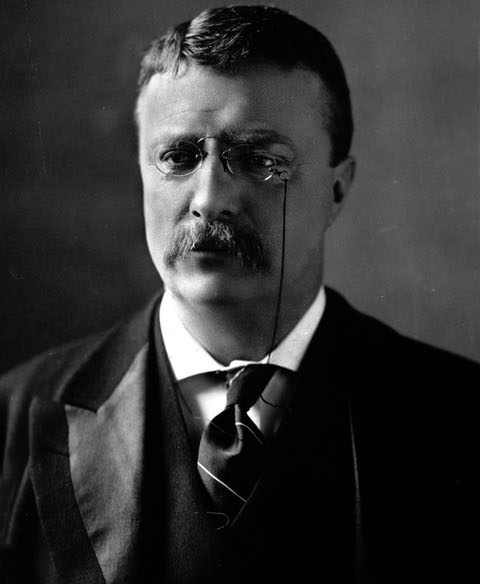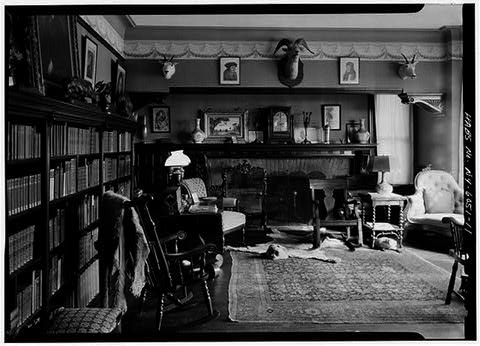
Teddy Roosevelt seems to us a paradox today, and did in his time as well: A man’s man hunter, cowboy, and war hero, who supposedly saved the game of football from extinction (Roosevelt worried that banning the game would produce “mollycoddles instead of vigorous men”); also, a Harvard-educated New York progressive and treehugging conservationist hero, who re-defined presidential style with Brooks Brothers three-piece suits and uniforms. And for all of his public heroics, Roosevelt was also a doting father who gave his nickname to the most universally cuddly species of bear. Perhaps some of the best representations of Roosevelt’s personal ethos are photographs of his combination library and gun room, hung with hunting trophies and skins in the home he built for his family in Oyster Bay, New York (below—see more at the appropriately named “Art of Manliness”).

One significant reason Roosevelt could embody seemingly widely divergent traits was that he was a devourer of books, reading tens of thousands in his lifetime, absorbing thousands of points of view from every possible source. But Roosevelt did not read the way we do today—rapidly taking in information for its own sake, with automated services compiling recommendations from the metadata (a phenomenon Susan Jacoby has indicted as part of our hyper-partisan, groupthink culture). He read according to his whim, putting pleasure ahead of profit and disdaining fads and rigid cultural norms. He was, literary site Book Riot supposes, “probably the most well-read president, and perhaps one of the most well-read men in all of history.”
Book Riot points us toward a few pages of Roosevelt’s autobiography, in which—amidst picaresque chapters like “In Cowboy Land” and heavy ones like “The Presidency; Making an Old Party Progressive”—Roosevelt pauses to detail his thoughts on reading in a particularly pragmatic chapter titled “Outdoors and Indoors.” Although Roosevelt does not present his contemplation as an easily digestible list of rules, as is the fashion now, Book Riot has seen fit to condense his thought. Below see the first five of their list, “Teddy Roosevelt’s 10 Rules for Reading.” I’d be willing to bet that if everyone followed Teddy’s advice, we could up the woeful national literacy quotient within a few short years.
1. “The room for choice is so limitless that to my mind it seems absurd to try to make catalogues which shall be supposed to appeal to all the best thinkers. This is why I have no sympathy whatever with writing lists of the One Hundred Best Books, or the Five-Foot Library [a reference to the Harvard Classics]. It is all right for a man to amuse himself by composing a list of a hundred very good books… But there is no such thing as a hundred books that are best for all men, or for the majority of men, or for one man at all times.”
2. “A book must be interesting to the particular reader at that particular time.”
3. “Personally, the books by which I have profited infinitely more than by any others have been those in which profit was a by-product of the pleasure; that is, I read them because I enjoyed them, because I liked reading them, and the profit came in as part of the enjoyment.”
4. “The reader, the booklover, must meet his own needs without paying too much attention to what his neighbors say those needs should be.”
5. “He must not hypocritically pretend to like what he does not like.”
Head over to Book Riot for the remaining five of Roosevelt’s “rules,” along with some witty commentary.
Related Content:
‘The Right of the People to Rule’: Listen to Theodore Roosevelt Speaking 100 Years Ago Today
Ernest Hemingway Creates a Reading List for a Young Writer, 1934
Josh Jones is a writer and musician based in Durham, NC. Follow him at @jdmagness


Leave a Reply